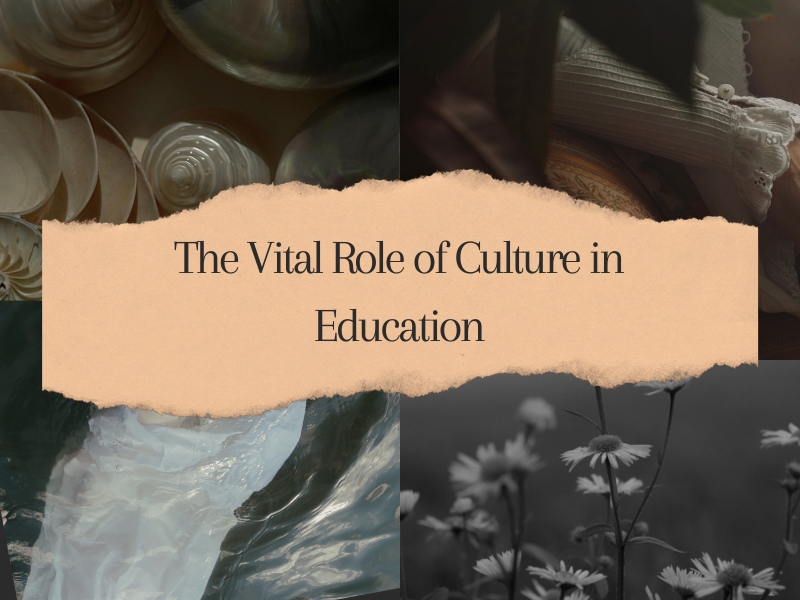In an era of rapid globalization and interconnectedness, cultural diversity has become more relevant than ever before. Yet, in education curriculums, the focus often remains on history and academic subjects, overlooking the critical role of culture. As we navigate a rapidly changing world, it becomes increasingly important to include culture in the education curriculum. This blog article explores the significance of embracing cultural diversity in education, highlighting the reasons why the new generation must learn and preserve their own culture and traditions. From the impact of globalization to the importance of the mother tongue, we will uncover the manifold benefits of integrating culture into education, fostering a sense of identity, empathy, and global citizenship among students.
Preserving Cultural Heritage
Preserving cultural heritage through education is a powerful means of celebrating the rich and diverse identities of each community. Culture encompasses a vibrant tapestry of customs, traditions, language, and art that shapes the unique identity of a group of people. By integrating culture into the education curriculum, students are provided with a deeper connection to their roots and heritage, fostering a sense of pride and belonging.
Understanding and appreciating one’s own culture and the cultures of others helps students develop a broader perspective of the world, embracing its rich tapestry of traditions. Learning about different cultural practices and beliefs nurtures empathy and tolerance, promoting a more inclusive and harmonious society.
Moreover, preserving cultural heritage through education plays a crucial role in passing down traditional knowledge and wisdom from one generation to another. By sharing stories, rituals, and artistic expressions that have been handed down over time, students gain insights into the historical and social contexts of their communities.
Building Cultural Awareness
Building cultural awareness through education is essential for creating a more inclusive and empathetic society. By exposing students to different cultures, traditions, and customs, education helps cultivate empathy and respect for others. Through learning about diverse cultures, students gain insights into the shared humanity that unites people from different backgrounds. This exposure to cultural diversity reduces stereotypes and promotes tolerance, fostering a deeper appreciation for the richness of human experiences. Education serves as a bridge that connects individuals from various cultural backgrounds, promoting understanding and acceptance in a world that celebrates diversity.
Nurturing Global Citizenship
Nurturing global citizenship through education is crucial in preparing students to be responsible and engaged global citizens. In an interconnected world, understanding and appreciating different cultures and global issues are vital. By including culture in education, students gain a broader perspective of the world and develop a sense of responsibility towards global challenges. They learn to respect cultural differences and collaborate with people from diverse backgrounds, fostering mutual understanding and cooperation. Education plays a pivotal role in empowering students to actively participate in addressing global issues, contributing to a more inclusive and harmonious world.
Empowering Identity and Self-esteem
Empowering identity and self-esteem through education involves recognizing and celebrating one’s own culture and traditions. When students learn about their cultural heritage, they develop a deeper sense of pride and belonging to their community. Understanding the significance of their cultural practices and customs fosters a positive self-image, leading to increased self-esteem and confidence. Embracing one’s identity in a diverse world enhances a sense of self-worth and instils a strong sense of cultural pride, contributing to a more confident and resilient individual. Education plays a vital role in nurturing a positive self-identity, promoting a sense of belonging, and fostering a healthy appreciation for one’s cultural roots.
Appreciating Multilingualism and Mother Tongue
Appreciating multilingualism and mother tongue in education is crucial for preserving cultural identity and promoting linguistic diversity. Mother tongue serves as a vessel for transmitting cultural values, traditions, and ancestral wisdom from one generation to another. Integrating the mother tongue in the education curriculum not only fosters language preservation but also nurtures a deeper connection to cultural roots. By embracing multilingualism, students gain a broader understanding of different cultures and languages, fostering a more inclusive and empathetic society. This appreciation for linguistic diversity enriches cultural understanding among students, allowing them to communicate and connect with diverse communities with a sense of respect and cultural appreciation.
Conclusion
In conclusion, the integration of culture in the education curriculum holds immense significance in today’s diverse and interconnected world. As students engage with diverse cultures, traditions, and languages, they develop empathy, respect, and appreciation for the rich tapestry of human experiences. By learning about their own cultural heritage and that of others, students gain a deeper understanding of their identity and foster a sense of belonging. The exposure to cultural diversity not only promotes tolerance and acceptance but also nurtures global citizenship, preparing students to be responsible and engaged members of a globalized society. Embracing cultural diversity in education empowers the new generation to bridge gaps, embrace differences, and create a more harmonious and inclusive world. As educators and learners, it is our collective responsibility to celebrate cultural diversity and promote cultural exchange in education, fostering a sense of unity and mutual understanding among students from all walks of life.

